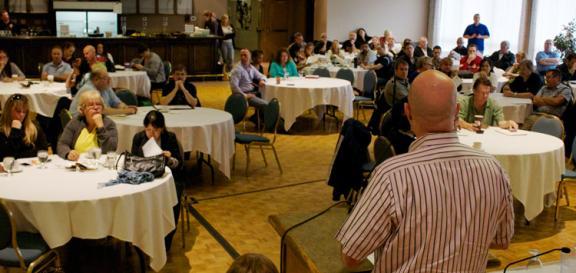For most MoveUP members, their very first contact with the union is through their job steward. Job stewards make sure the union office staff and elected representatives know what’s happening on the ground in all our workplaces, as well as helping their coworkers resolve day-to-day workplace problems.
In times of workplace transition like what we’re going through right now at ICBC, the role of a steward is crucial to make sure members’ rights are protected. That’s part of the reason why ICBC job stewards gathered yesterday in Burnaby for a special meeting and training session.
Outgoing Vice-President for ICBC, Jeff Gillies, kicked off the meeting by talking about his experience starting out as a union member working in ICBC claims. It wasn’t long before he started noticing some things going on in the workplace “just didn’t seem right”. There were areas where the corporation just wasn’t following the collective agreement, and Jeff took it upon himself to try to fix those things through the union.
“All these issues that we’re talking about today, you can do something about on the ground floor,” Jeff said, noting that the involvement of average members on issues like being expected to work unpaid overtime, have resulted in significant wins.
“If you’re involved in the workplace, pointing out violations in the collective agreement and really getting involved, it does make a difference,” Jeff concluded.
Jeff introduced newly-elected Vice-President Annette Toth, who comes to us from the Victoria Claims Centre, where she has been working as a Senior Injury Adjuster.
Annette echoed Jeff’s words and said she’s optimistic that we can make positive change in our workplaces, but “it’s going to take all of us stepping up and making change for our members.”
A bit later, stewards heard from new MoveUP union representative Cheryl Popeniuk, who has years of experience working as a rep at Teamsters Local 31.
She said when she started at MoveUP she was surprised that we weren’t encouraging stewards to become more empowered by taking responsibility to resolve basic workplace issues. At Teamsters, she said, “The stewards would file their own grievances. They would step into the managers’ offices and try to resolve issues before they became grievances. This was very important because by the time we got involved they’d already gathered a lot of information on the on-the-ground issues.”
She said she knows it can be uncomfortable for job stewards to take on filing grievances, but said “you have an opportunity to build a relationship with your management and your coworkers and go in there and try to resolve that issues. It’s empowering to you and empowering to the rest of the members.”
She reminded stewards that grievances happen when there is a violation of the collective agreement, and that the collective agreement is something the employer signed onto.
“If there’s a violation of that agreement you have every right to walk in there are say this isn’t the way it’s supposed to be…We shouldn’t be embarrassed about it and we shouldn’t be nervous about it,” she said.
Next, Senior Union Representative Jaime Zygmunt went through key rights of job stewards under the collective agreement, including the right to be present at any meeting that might be disciplinary. Zygmunt noted the test for this is whether the member feels there is the potential for discipline to happen at the meeting, not whether the manager says it is disciplinary.
After lunch MoveUP Executive Board member for ICBC Karin Cirez and MoveUP Occupational Health and Safety Director Steve Milne gave a presentation on occupational health and safety rights, and specific issues at ICBC.
Karin and Steve both noted ICBC hasn’t always done their due diligence on health and safety issues and urged members to be vigilant about potential issues in the workplace and to bring those forward to their occupational health and safety committee.
One issue raised by stewards who work in customer-facing jobs is that of workplace violence, particularly threats or aggression from angry customers.
“The [legal] definition of workplace violence is your perception, if you feel you’re being threatened,” said Steve Milne, who encouraged members to document and report any of these kinds of incidents and not feel pressured to “just let it go”.
Next, lawyer Allan Black spoke about our ongoing unpaid overtime case. Though the corporation appealed our win on unpaid overtime, there have been no further developments. However, Black encouraged members to carefully document everything around working overtime. If there isn’t a workload committee in your workplace, Black’s advice is to tell your managers when you have an unmanageable workload.
“It’s only when people stand up and say they won’t do it, and when stewards make sure their coworkers aren’t doing it, that the company will stand up and fix it,” said Black.
Executive Councillor and Commercial Claims Adjuster Brian Martens reiterated this in his subsequent presentation on workload committees. He suggested stewards and members going to managers about their workload concerns express the concerns in terms of how customers are affected (e.g. “10 customers are waiting for someone to return their voice mails” rather than “I have 10 more voice mails to return”).
Martens said it’s important to get the workload committees up and running in every worksite, even though we’re in a transition period, because there are ongoing problems that need to be addressed sooner rather than later. If you don’t yet have a committee in your workplace and are interested in being involved, please email Brian at bmartens@moveuptogether.ca or Yasmin Carroll at ycarroll@moveuptogether.ca.



